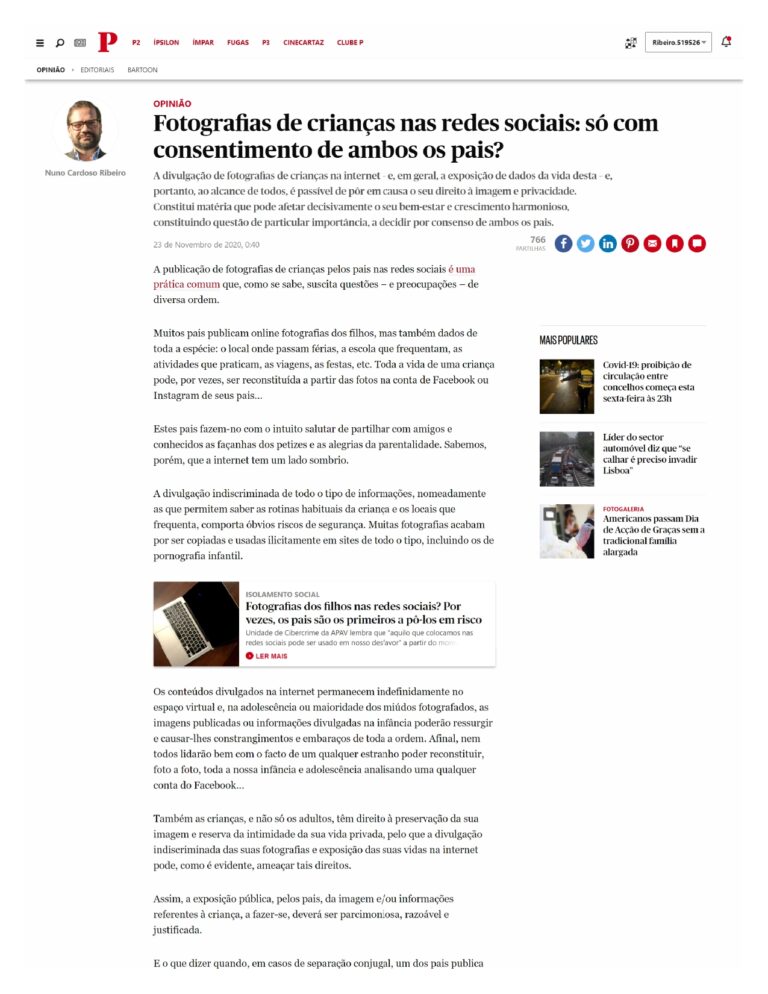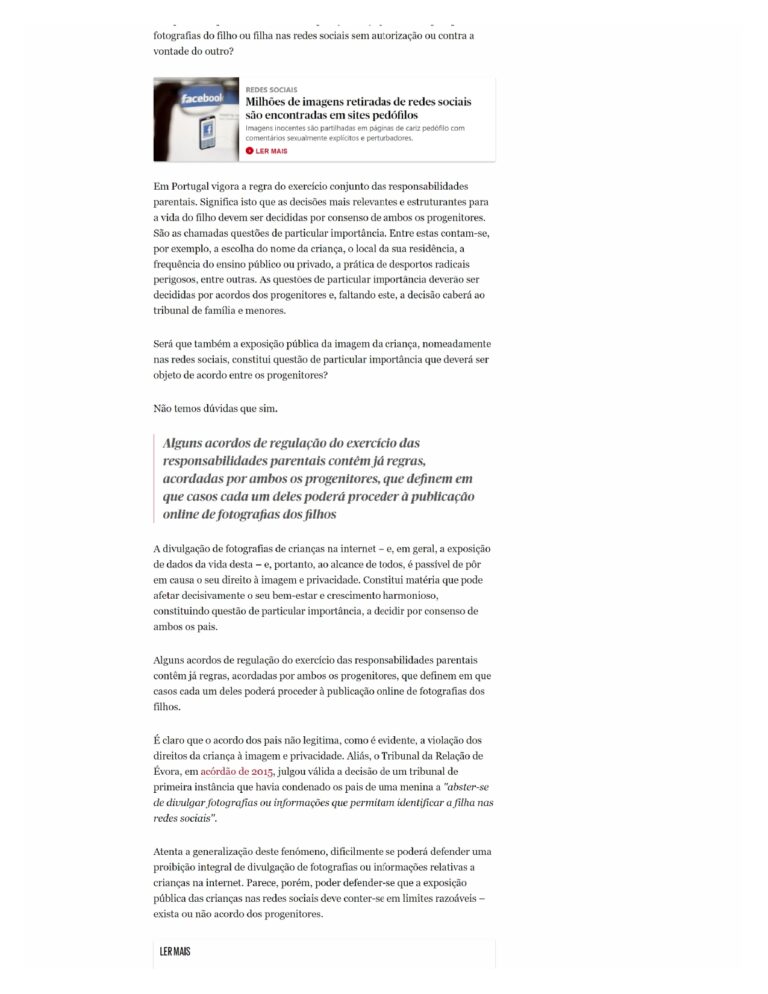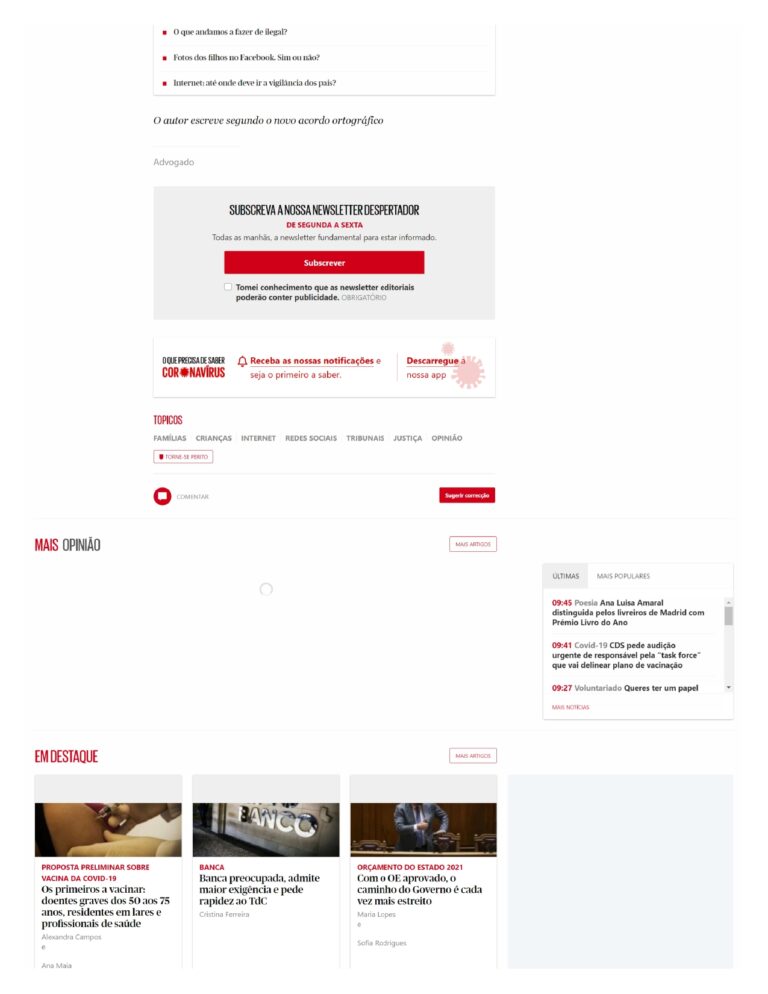Opinion article by our coordinator, Nuno Cardoso-Ribeiro, in Público on 11/23/2020, related to children’s photos on social networks and parental consent. Read the article on the Público website or the translation and pdf below:
“Photographs of children on social media: only with consent of both parents?
The dissemination of children’s photographs on the Internet – and, in general, the exposure of data about their lives – and thus within everyone’s reach, is likely to jeopardize their right to their image and privacy. It is a matter that can decisively affect their well-being and harmonious growth, constituting a matter of particular importance, to be decided by consensus of both parents.
The publication of photographs of children on social networks is a common practice that, as we know, raises questions – and concerns – of various kinds.
Many parents post photos of their children online, but also data of all kinds: where they spend their vacations, the school they attend, the activities they do, parties, etc. A child’s entire life can sometimes be reconstructed from the photos on his or her parents’ Facebook or Instagram account…
These parents do.us with the salutary intent of sharing with friends and acquaintances the exploits of their little ones and the joys of parenting. We know, however, that the internet has a dark side.
The indiscriminate disclosure of all kinds of information, particularly those that allow us to know the child’s usual routines and the places they frequent, carries obvious security risks. Many photographs end up being copied and illicitly used on sites of all kinds, including child pornography sites.
The content posted on the Internet remains in virtual space indefinitely, and when the photographed children reach adolescence or adulthood, the images posted or information divulged during childhood may resurface and cause them all sorts of embarrassment. After all, not everyone will deal well with the fact that some stranger can reconstruct, photo by photo, our entire childhood and adolescence by analyzing any Facebook account…
Children too, and not only adults, have the right to have their image and intimacy of their lives preserved, so indiscriminate disclosure of their photos and exposure of their lives on the Internet can, of course, threaten these rights.
Thus, public exposure, by parents, of the image and/or information concerning the child, if it is to be done, must be parsimonious, reasonable and justified.
And what about when, in cases of marital separation, one of the parents publishes photographs of the son or daughter on social networks without authorization or against the wishes of the other?
In Portugal the rule of joint exercise of parental responsibilities applies. This means that the most relevant and structuring decisions for the child’s life should be decided by consensus of both parents. These are the so-called issues of particular importance. These include, for example, the choice of the child’s name, the place of his or her residence, attendance at public or private schools, the practice of dangerous extreme sports, among others. Matters of particular importance should be decided by agreement between the parents, and failing that, the decision will be taken by the family and children’s court.
Is the public exposure of the child’s image, namely on social networks, also a matter of particular importance that should be subject to agreement between the parents?
We have no doubt that it is.
The dissemination of photographs of children on the Internet – and, in general, the exposure of data about their lives – and therefore within everyone’s reach, is likely to jeopardize their right to their image and privacy. It is a matter that can decisively affect their well-being and harmonious growth, constituting a matter of particular importance, to be decided by consensus of both parents.
Some agreements regulating the exercise of parental responsibilities already contain rules, agreed upon by both parents, defining the cases in which each parent may publish photographs of their children online.
Of course, parental agreement does not legitimize the violation of the child’s rights to image and privacy. In fact, the Court of Appeal of Évora, in a judgment of 2015, considered valid the decision of a trial court that had ordered the parents of a girl to “refrain from disclosing photographs or information that would allow the daughter to be identified on social networks”.
Given the generalization of this phenomenon, it is difficult to defend a total ban on the disclosure of photographs or information about children on the Internet. However, it seems arguable that public exposure of children on social networks should be kept within reasonable limits – whether or not parents agree.”


